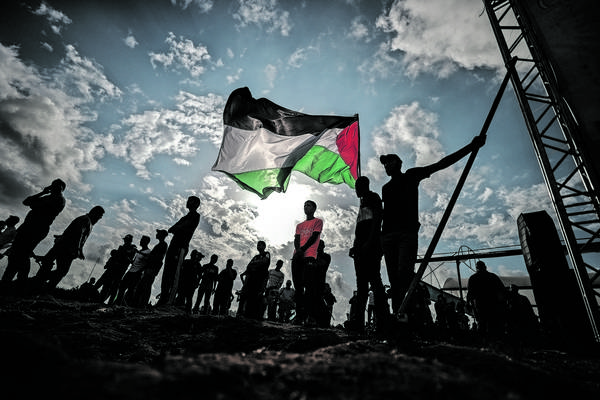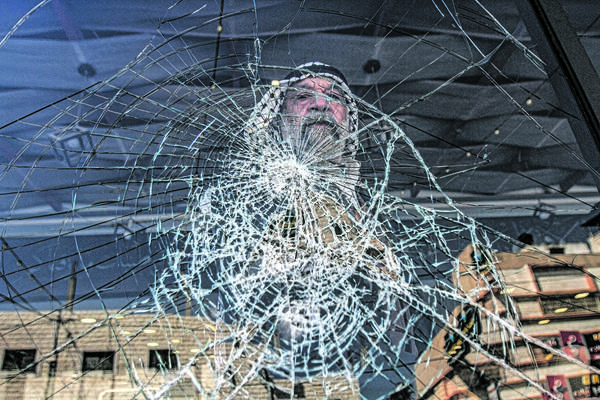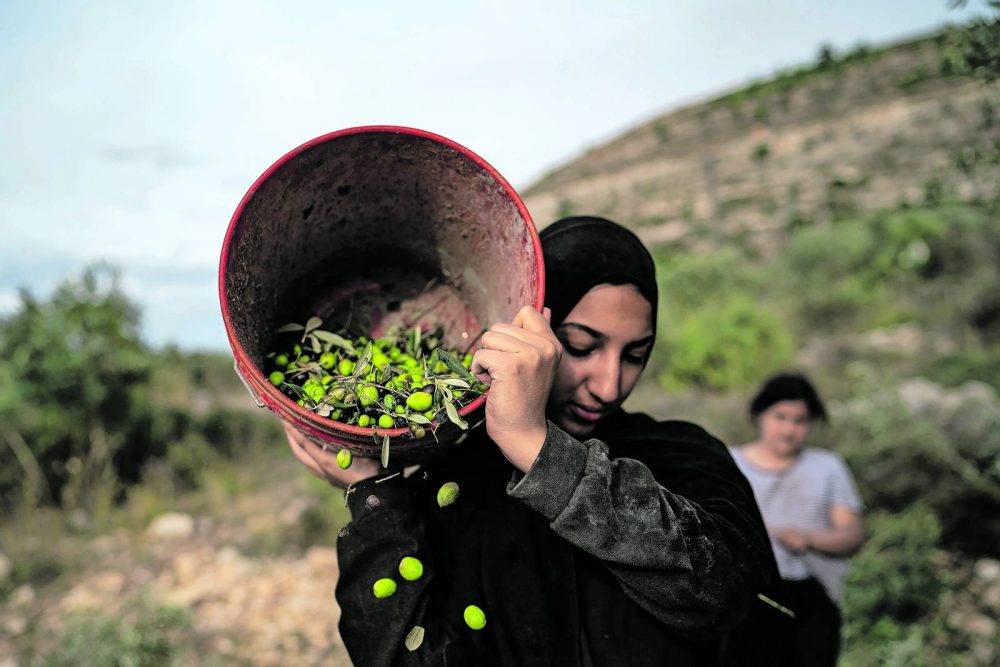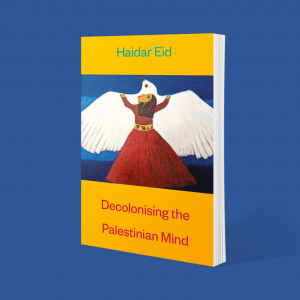Twisted logic: In 1993, then Russian Foreign Minister Andrei Vladimirovich Kozyrev, Israeli Prime Minister Yitzhak Rabin, US President Bill Clinton, Palestine Liberation Organisation leader Yasser Arafat, US Secretary of State Warren Christopher and Palestine Liberation Organisation negotiator Mahmoud Abbas look on at the signing of the Oslo Peace Accords. (Photo by Mark Reinstein/Corbis via Getty Images)
We had to wait for Israel’s leading human rights organisation B’Tselem’s then new position paper, “A regime of Jewish supremacy from the Jordan River to the Mediterranean Sea: This is apartheid” in 2021, preceded by the Human Rights Watch Report, and followed by Amnesty International’s devastating detailed research, to draw the attention of Western media outlets, the likes of The Guardian, CNN and The Washington Post, to the fact that Israel, after all, is an apartheid state.
Also, that it discriminates against half of the population, which happens to be Palestinian, between the Jordan River and the Mediterranean Sea.
Not Edward Said, nor Archbishop Desmond Tutu and other South African anti-apartheid activists, or even the UN Special Rapporteurs on the human rights situation in the Palestinian territories occupied since 1967, Richard Falk and John Dugard, to mention but a few conscientious human rights fighters, were able to do that.
It had to come from “one of us” white, middle class, and — most importantly — Israeli Jew. Just a few years ago, the comparison with the apartheid regime of South Africa was considered taboo, thanks to the guilt complex originated from one of the worst pogroms in the history of humanity, namely, the slaughter of millions of innocent Jews at the hands of white, European bigots.
The whites of apartheid South Africa defined the institutions of the country as democratic — albeit white democracy, ie, by and for whites only. However, the idea of defining the country as exclusively white and democratic at the same time was never accepted by the international community.
I happen to be a naturalised South African of Palestinian origin. I spent more than five years in Johannesburg, during which I earned a PhD from the University of Johannesburg. This is my background, experiencing two apartheids, one of which is lying at the bottom of the dustbin of history, while the other is thriving and basking in the glory of ethno-religious supremacy, aided and supported by ex-colonial and imperialist Western powers.
 eople protest on the 30th anniversary of the accords in Gaza City in September. (Photo by Ali Jadallah/Anadolu Agency via Getty Images)
eople protest on the 30th anniversary of the accords in Gaza City in September. (Photo by Ali Jadallah/Anadolu Agency via Getty Images)
These same powers pay lip service to the suffering of the Palestinian people by repeating the mantra of the racist, two-state solution as if there are two symmetrical sides. Instead of calling a spade a spade and calling it settler-colonialism and apartheid, they insist on calling it the “Israeli-Palestinian conflict”. But were there “two sides” to the South African “conflict”?
Were there two equal parties, namely white and black, with equal claims to the land and equal historical responsibility for the then status quo? No doubt, this sounds like a bizarre interpretation of South African history, which we Palestinians find equally astounding when applied to our history and our reality today.
The South African anti-apartheid goal, adopted by anti-apartheid activists all around the world, was unequivocal: the end of the racist system and ideology of apartheid. There could be no tolerance of apartheid practices; no creation of Bantustans. The system had to be dismantled in its entirety.
Many South Africans, supported by a sustained global anti-apartheid campaign, sacrificed their lives to bring down the Bantustans, euphemistically called independent homelands by the apartheid regime.
Like black South African resistance, ours is morally superior to apartheid because it is inclusive where apartheid focuses on separation; it is embracing where apartheid focuses on division; it is life-affirming where apartheid is violent and murderous.
On the other hand, like apartheid South Africa, in the State of Israel, all human beings are not equal. There are fundamental artificially created and selectively rewarded levels of citizens in the state. Israel defines itself as a Jewish state.
It, therefore, creates a bizarre distinction between “nationality” and “citizenship”.
Almost 22 percent of the citizens of Israel are Palestinians who are excluded from such a definition. Thus, Israel is not the state of its citizens, but rather that of “the Jewish people”, most of whom have no birthright connection to it.
All Jews, wherever they are born, enjoy full rights in Israel, rights that apartheid Israel denies to us, the indigenous people of this land. They also call us “Israeli Arabs”, “Jerusalem residents”, “Arabs of the territories”, not to mention the refugees living in the diaspora, whose mere mention always spoils any party, and whose right to return and compensation is sanctioned by International Law (UNGA resolution 194).
 Damage to a Palestinian’s restaurant after an attack by Jewish settlers in the West Bank. (Photo by Nasser Ishtayeh/SOPA Images/LightRocket via Getty Images)
Damage to a Palestinian’s restaurant after an attack by Jewish settlers in the West Bank. (Photo by Nasser Ishtayeh/SOPA Images/LightRocket via Getty Images)
Israeli nationality, therefore, is non-existent. Instead, there is “Jewish nationality”. This is not unlike emphasising “white nationality” as opposed to, say, South African nationality. The International Convention on the Suppression and Punishment of the Crimes of Apartheid (ICSPCA), Article 2, Part 3, clearly defines apartheid as:
“Any legislative measures and other measures calculated to prevent a racial group or groups from participation in the political, social, economic and cultural life of the country and the deliberate creation of conditions preventing the full development of such a group or groups, in particular by denying to members of a racial group or groups basic human rights and freedoms, including the right to work … the right to education, the right to leave and return to their country the right to a nationality, the right to freedom of movement and residence.”
This definition, in its entirety, clearly applies not only to the Palestinian people residing in the West Bank and Gaza Strip but also to those living in Israel itself. Hence, the importance of B’Tselem’s conclusion: “The entire area Israel controls between the Jordan River and the Mediterranean Sea is governed by a single regime working to advance and perpetuate the supremacy of one group over another.”
Furthermore, ICSPCA, Article 2, Part 4, makes it crystal clear that: “The term ‘the crime of apartheid’’, shall apply to any measures including legislative measure, designed to divide the population along racial lines by the creation of separate measures and ghettos for the members of a racial group or groups [and]the expropriation of landed property belonging to a racial group or groups or to members thereof.”
I, myself, am a resident of Gaza. Like so many Palestinians, I have legal title to my parents’ land in Israel, but have no “legal” right to it because my parents’ property, like that of millions of other Palestinians, was taken away from us and given over to Jewish ownership. The facts are that Jews owned only 7 percent of Palestine before 1948; today, 93 percent is considered “state land” and can only be owned by Jews or Israel.
It is time to call Israel to task, the same way the ugly apartheid regime was held accountable; it is time to heed the call made by the overwhelming majority of Palestinian civil society sectors and sanction apartheid Israel until it complies with international law by adhering to universal principles of equality and dignity.
Saeb Erekat, chief Palestinian negotiator and secretary general of the executive committee of the Palestine Liberation Organisation (PLO), died at the age of 65 in 2020. Some Palestinians have seen his death as a metaphor for the end of the Oslo era and its twisted logic. Erekat and many Palestinian political functionaries of his generation have firmly stood by the so-called two-state solution, insisting that the Palestinians will be able to strike a fair deal with the Israelis and their US patrons to establish an independent Palestinian state on parts of historic Palestine.
 The Ajak family, who have been harvesting olives in the West Bank for over a century, have been harassed by the Israeli military. (Photo by Salwan Georges/The Washington Post via Getty Images)
The Ajak family, who have been harvesting olives in the West Bank for over a century, have been harassed by the Israeli military. (Photo by Salwan Georges/The Washington Post via Getty Images)
The illusion that this is actually possible has been maintained through decades of continued colonisation and disastrous agreements. It is “the opium of the Palestinian people”. The accords with Israel signed by Egypt in 1978 at Camp David, by the Palestinians in 1993 in Oslo, and Jordan in 1994 in Wadi Araba were supposed to be necessary steps towards Palestinian self-determination and “peace” in the Middle East. But all these agreements ignored the existence of the Palestinian people as a people and their basic rights, including the right of return of Palestinian refugees and equality for Palestinian citizens of Israel.
Instead of insisting on those fundamental rights and following the example of South Africa’s anti-apartheid movement, which mobilised international civil society around the idea of one person, one vote, and the establishment of a secular democratic, non-racial, non-sectarian state, the Palestinian political leadership reduced the Palestinian people to only those living in the West Bank, the Gaza Strip and East Jerusalem.
This resulted in the formation of a Palestinian Bantustan of incongruous territories, where Palestinians live under the constant terror of a military occupation and where the Palestinian Authority (PA) does not actually exercise full authority. The insistence on continuing down the Oslo path towards an illusory two-state solution has persisted even after Israel passed a nation-state law, in which it explicitly declared the right to self-determination in “the land of Israel” to be “unique to the Jewish people”.
In other words, according to the Israeli state, the Palestinians cannot enjoy that right. And it has persisted even as Arab states have pressed forward with normalisation with Israel without any concessions along the formula “peace for land” and as the US has put forward yet another “peace deal” in which it offers the Palestinians nothing more than humiliating subsistence.
Oslo and its derivative processes ignore the obvious problem — the apartheid regime which Israel has effectively imposed on historic Palestine. They also do not pay attention to the consciousness of sumud (steadfastness) that has emerged out of the Palestinian struggle. Nor do they take into account the long Palestinian legacy of civil and political resistance. Over the years, many Palestinians have come to see Oslo for what it is and have opted to draw alternative paths to secure Palestinian rights.
In 2001, a year after the Second Intifada erupted, the NGO forum of the World Conference Against Racism was held in Durban, South Africa. It offered a very clear diagnosis of the nature of the Zionist project and paved the way for a much more practical but also progressive path to a new intersectional cooperation between the oppressed Palestinians and other marginalised groups.
In 2005, the BDS movement was created, and two years later, the BDS national committee was formed to map its forward trajectory. BDS, along with the establishment of the One Democratic State Campaign and the Great March of Return — to give but a few examples — all represent the beginning of a process of de-Osloisation of the Palestinian mind. And in this process, Gaza has played a central role.
 A cover of the book.
A cover of the book.
Most events that have taken place in the strip since the 2006 legislative elections represent an outright rejection of the Oslo Accords and their consequences. When we bear in mind that 75-80 percent of Gaza residents are refugees, the anti-colonial and anti-Oslo context of the election results becomes that much clearer.
In the following years, the calls for an alternative paradigm that divorces itself from the fiction of the “two-prison solution” intensified. It is a paradigm that takes the sacrifices of the people of Gaza as a turning point in the struggle for Palestinian liberation, one that builds on the growing global anti-apartheid movement that has been given an impetus by the 2009, 2012, 2014, 2021 and 2023 onslaughts on Gaza and by the Great March of Return.
The de-Osloisation of Palestine, for most Palestinian activists, has become a precondition for the creation of peace with justice. That requires a redefinition of the Palestinian cause as an anticolonial struggle against a system of settler-colonialism and apartheid. It also asked for the reunification of the three components of the Palestinian people, namely, Gaza and the West Bank residents, refugees and Palestinian citizens of Israel. The first steps of this process were taken in Durban in 2001.
The Durban WCAR declaration, in a very peculiar way, demanded that Palestinians take up the most effective tool of international solidarity with their struggle to end apartheid in historic Palestine. The language used in the declaration was clear, diagnostic, strong, and — most importantly — uncompromising on basic human rights:
“We declare Israel as a racist, apartheid state in which Israel’s brand of apartheid as a crime against humanity has been characterised by separation and segregation, dispossession, restricted land access, denationalisation, ‘bantustanisation’ and inhumane acts.”
And this has, to all of us in Palestine, been the beginning of our South African moment, a step in our long walk to freedom, equality and justice.
Decolonising the Palestinian Mind is published by Inkani Books. Haidar Eid is a South-African-Palestinian author and associate professor of postcolonial and postmodern literature at Gaza’s al-Aqsa University.